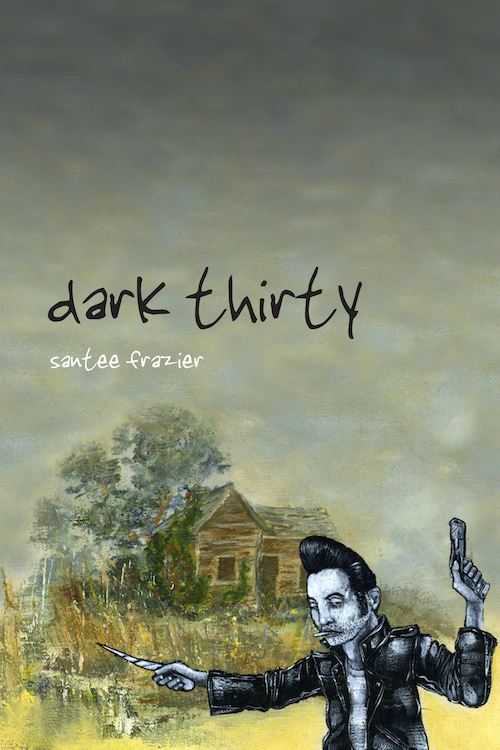To Find the Subject by Leaving the Subject: Expectations of Race & Content

In 2005 when I was an undergraduate in creative writing I entered a poetry-residency contest. One of the competition’s rules was that the applicant must be of Native American descent. A couple months passed and I received two letters: one thanked me for submitting my poetry and congratulated me on making fourth place; the other was filled with comments by the final judge. In the second letter, the first paragraph stated that my poems are repetitive in style and form, and that the “line breaks, line lengths, word spacing” distract from the subject matter. In the next two paragraphs the letter mentioned that the poems have “no centralized theme” except language itself, and, unfocused connections to “shapes of letters and punctuation—and bones or skeletons.” But the most interesting part of the evaluation was in the fourth paragraph, where the judge wrote, “I would ask this writer to think about what is important to him as a Native person and to incorporate these values within the poetry.” When I read that sentence I thought: so I guess my poems don’t know what it means to be Native American? At the same time, I also wondered why the judge hadn’t considered the “art of it” as having leverage and importance. I suspect that for her the “themes” should have been centered around Native American viewpoints and concerns, such as oral tradition, identity politics, or land and sovereignty. In my mind, poetry does not have to address subject matter directly, especially if one creates art as an exploration of imagination through language.
As anyone who has ever talked to me knows, I have strong opinions about racial politics, but when I write a poem, ideas of race as subject matter do not directly come to mind. I am much more interested in language and its deep sense of immediacy. I am not saying I don’t think about race—I do—or have not experienced prejudice or racism—I have. I’m only saying when it comes to writing, my intuition and intellect gravitate toward aspects of craft instead. One can argue language is always connected to race and vice versa; this may be why my poems ultimately reflect an intersection of Diné thought and English fluency. But I find my sensibilities are attuned to how a poet builds her or his poems rather than focusing on content, which may overwhelm a poem. Yet this is not to say that I believe one must avoid ideas of race entirely or sacrifice content; rather, it is to say, there are a myriad of ways in which a poem can navigate those issues on the page. In his essay “Writing Off the Subject,” the poet Richard Hugo suggests that we quickly leave behind what he called the “triggering subject,” by which he meant the subject we thought we wanted to write about, and let sound carry us to a truer engagement with the world. Or as Hugo put it himself, “Never write a poem about anything that ought to have a poem written about it, a wise man once told me. Not bad advice but not quite right. […] Subjects that ought to have poems have a bad habit of wanting lots of other things at the same time. And you provide those things at the expense of your imagination."
As a reader and listener I am most mindful of hearing sound, experiencing imagery, engaging form, feeling an emotional intensity, and understanding the intellectual urgency within the language of a poem. When I read Santee Frazier’s “Mangled” poems, for example, a series of poems that follow the protagonist, a man named Mangled Creekbed, through various episodes of his life, it is the language I respond to first. Almost every one of the poems is in prose-block form but one can still hear the sonic intensity and tightness of its poetic lines. As in this excerpt from the poem “Mangled, Letters, and the Target Girl,” in which Frazier explores the sound of words within the line while at the same time reinforcing the content through the movement from monosyllabic to multisyllabic words, and the disruption of conventional syntax to reveal Mangled’s particular way of engaging the world:
Only to hoot, to speak flitting blade in the dark, mouth
able to sound verb for thing, him chicken eat. Not know
gallop but for sound, stud but for knotting haunches,
tipping its body, arching its head toward dirt. Chewing
hay under a ranch that, bean-juice skin tight as saddle
leather, neck stiff as a coffee can—as lanterns go out,
stud fed and tied to post—Mangled piles up some hay,
rests his bones for the long day of pounding tent stakes.
In an interview, Frazier comments on how Mangled began as music first and only later developed into a character. This idea of transforming sound into being is interesting when we consider that the word “person” is formed from per- which means through or by means of and son which is the root of “sound.” Mangled, the character, though fictional, is cast “through sound” as a real per-son, as a circus performer who throws knives, who loves comic books and the heavy drink, whose face resembles a skillet, and who constantly finds himself involved in undignified adventures and prolonged solitude. He is an embodiment of movement and rhythm discovered through line and craft. And the only reference Frazier makes to Mangled’s ethnicity is when he describes him as having “bean-juice skin,” a phrase that acts as a kind of anodyne interpretation of race. But when we read Frazier’s sentences first, rich in sound and cadence, we can begin to see that poetic language could possibly subvert and transcend readers’ expectations—and if Richard Hugo is right—the writer’s own expectations of race and content in poetry as well.
Poet Orlando White is from Tólikan, Arizona. He is Diné of the Naaneesht’ézhi Tábaahí and born for the...
Read Full Biography

